|
|
|
Sort Order |
|
|
|
Items / Page
|
|
|
|
|
|
|
| Srl | Item |
| 1 |
ID:
092644


|
|
|
| 2 |
ID:
092641
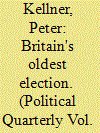

|
|
|
|
|
| Publication |
2009.
|
| Summary/Abstract |
Fringe political parties did well in the European Parliament elections in June 2005. The British National party won their first seats; altogether, four in ten British voters supported a party not represented in the House of Commons at Westminster. YouGov questioned more than 32,000 electors at the time of the election, in order to find out who voted for each party and why: the sample was big enough to enable robust analysis to be done on the BNP, UKIP and Green vote, as well as the supporters of Labour, the Conservatives and the Liberal Democrats. YouGov's findings show that there was disillusionment with the traditional main parties, and fears for the future, that were felt by voters across the political spectrum, and not just the supporters of the fringe parties.
|
|
|
|
|
|
|
|
|
|
|
|
|
|
|
|
| 3 |
ID:
092642


|
|
|
|
|
| Publication |
2009.
|
| Summary/Abstract |
As part of a strategy to remove perceived biases operating against it in the system used for elections to the House of Commons, the British Conservative party is promoting a revision of the rules used by the Boundary Commissions to ensure greater equality in constituency electorates. A Bill designed to achieve this-and also to reduce the size of the House-was introduced to the House of Lords in 2007. This paper critiques that Bill and suggests an alternative formulation that would better achieve the goal, whilst identifying a number of operational difficulties that its implementation would involve.
|
|
|
|
|
|
|
|
|
|
|
|
|
|
|
|
| 4 |
ID:
092651


|
|
|
|
|
| Publication |
2009.
|
| Summary/Abstract |
The issue of domestic violence has gained greater recognition within public policy in the United Kingdom over the past decade. There is a recognition that up to one million children may have been exposed to violence between the adults with whom they live. This has consequences for the child in both the short and long term in terms of social and emotional adjustment. However, most male perpetrators of domestic violence are never held to account through the criminal justice system and therefore the child protection system is the safety net for these children. This though can result in a response that is premised on women's responsibility to protect their child from experiencing harm, typically by either leaving or forcing her partner to leave. Child welfare professionals do not engage with the men who are the source of the problem, rather women are held accountable for allowing their children and themselves to be in this situation. In this article this issue is discussed and proposals offered to improve this situation through empowering women, holding men to account for their behaviour whilst also recognising their position as fathers.
|
|
|
|
|
|
|
|
|
|
|
|
|
|
|
|
| 5 |
ID:
092643
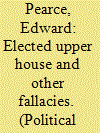

|
|
|
|
|
| Publication |
2009.
|
| Summary/Abstract |
All fashionable political talk is of an elected House of Lords. Doing this smart, new unthought-out thing, says Edward Pearce, means dissolving the reliably rebellious upper house regularly rejecting bad bills from Tory and Labour governments, for a House as submissive as the Commons. Second-line politicians will replace the difficult individual people, soldiers, doctors, academics, scientists, assorted and distinguished experts who, by lucky muddle, go there today.
|
|
|
|
|
|
|
|
|
|
|
|
|
|
|
|
| 6 |
ID:
092645
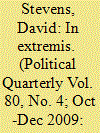

|
|
|
|
|
| Publication |
2009.
|
| Summary/Abstract |
The main policy reaction to the terrorist attacks of 7/7 and 21/7 of 2005 has been the development of the £6 million 'Preventing Violent Extremism' (PVE) initiative which aims, as part of the government's broader counter-terrorism strategy (CONTEST), to tackle support for, and the promotion of, violent Islamist ideologies within British society. One crucial component of this strategy is providing support for Muslim groups and individuals to tackle radicalisation and extremism directly at the local level. Funding and charitable status for mosques, Muslim community and youth groups and initiatives, 'forums against extremism', anti-extremism 'road shows', and the training of imams are included as part of this strategy. This article argues that this aspect of PVE is not only ill-advised, but potentially deeply counter-productive. It takes issue with two reasons that inform the PVE strategy: first, that what motivates individuals to join extremist groups are the religious ideas themselves; second, that government intervention or involvement is an effective method for rendering the moderate antidote attractive. Arguably, neither of these assumptions is warranted in the face of contrary evidence. Consequently, this arm of PVE is, at best, barking up the wrong tree; at worst, fuelling extremism.
|
|
|
|
|
|
|
|
|
|
|
|
|
|
|
|
| 7 |
ID:
092647


|
|
|
|
|
| Publication |
2009.
|
| Summary/Abstract |
Scotland's party system appears on the verge of major change with the Scottish National Party poised to supplant the Labour party as the dominant force. Under a charismatic leader, the SNP is using populist means to try and secure independence. However, real change appears elusive even if constitutional arrangements are altered further. The SNP distrusts democratic participation and is keen to rule through mobilised interests groups and the civil-service, strengthening the corporatist style of government characterising Scotland for centuries. Labour might avoid long-term marginalisation, if it was to embrace an agenda based on strong democratic citizenship and a broad nationalism which emphasises a continuing Union in which the benefits of devolution are clearly directed towards individual citizens as well as elite groups
|
|
|
|
|
|
|
|
|
|
|
|
|
|
|
|
| 8 |
ID:
092640


|
|
|
| 9 |
ID:
092646


|
|
|
|
|
| Publication |
2009.
|
| Summary/Abstract |
This article argues that the Labour Party has no new vision for British social democracy. New Labour in Government is intellectually tired and lacks ideological vision. Gordon Brown's leadership is managerial and lacking robust ideological content. These problems exist in a period of severe recession and whereby the Conservatives under David Cameron are in the ascendancy. The argument in this article asserts that revisionism is required in the Labour Party. An ideological revisionism which reconnects the Party with an overt vision of social democratic politics; which reconnects the Labour leadership with activists and supporters; and which inspires the next generation of Labour voters.
|
|
|
|
|
|
|
|
|
|
|
|
|
|
|
|
| 10 |
ID:
092650
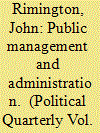

|
|
|
|
|
| Publication |
2009.
|
| Summary/Abstract |
Recently, British public management has relied too much on private sector approaches suited to market-facing situations, to the detriment of systems based on a realistic estimate of the special nature of public business, and its needs for economy and co-ordination. Accountability processes have suffered from over-simplification (targetry) and from a gross multiplication of mechanisms focusing on individual error, as opposed to ensuring intelligent assessment of business results. There has been an over-emphasis on management of inputs and outputs, as opposed to systems gearing the result-producing mechanisms to means for policy formation and co-ordination of effort. We need now to re-think and define properly the systems whereby ministers are advised, account is rendered, resources are allocated and effort is co-ordinated-and the qualifications of the relevant actors. Suggestions are made to these ends
|
|
|
|
|
|
|
|
|
|
|
|
|
|
|
|
| 11 |
ID:
092649
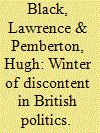

|
|
|
|
|
| Publication |
2009.
|
| Summary/Abstract |
Hay's argument that the 'winter of discontent' was essentially a manufactured crisis was discussed at the British Academy on the thirtieth anniversary of the 22 January 1979 public sector 'day of action'. In the edited transcript of that discussion which we publish here, three contemporary actors offer some support for, but also clear rejoinders to Hay. David Lea applauds the credit Hay gives to the efforts of the unions to make pay policy work in the late-1970s. David Lipsey argues Hay is wrong, it was a real crisis (albeit part of a battle between two very crude political narratives) and one in which the unions essentially betrayed the Labour government's attempts to sustain social democracy. Kenneth Baker also thinks the crisis was real, but he sees it as the inevitable end of Britain's postwar settlement. A number of other distinguished commentators also offer their perspective.
|
|
|
|
|
|
|
|
|
|
|
|
|
|
|
|
| 12 |
ID:
092648
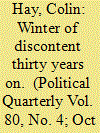

|
|
|
|
|
| Publication |
2009.
|
| Summary/Abstract |
Thirty years on, and in the context of our own crisis, it is perhaps useful to take stock of the last Winter of Discontent. The industrial strife that beset the Callaghan government in the winter of 1978/79 was seen at the time as a key factor in Labour's defeat in the general election of 1979; but its legacy is considerable and its significance enduring. These four themed essays come from a public seminar at the British Academy to mark the thirtieth anniversary of the Winter of Discontent. Colin Hay argues that the Winter of Discontent was, in key respects, a manufactured crisis lived, experienced and responded to through a very particular construction of the events that is difficult to reconcile with the evidence itself. Reponses by Lords Baker, Lea and Lipsey follow and the section concludes with a transcribed and edited version of the lively discussion which ensued.
|
|
|
|
|
|
|
|
|
|
|
|
|
|
|
|
|
|
|
|
|